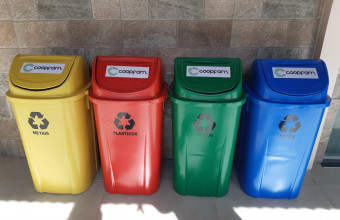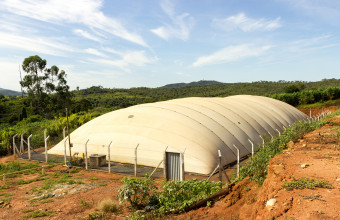Transforming environmental liabilities into clean and renewable energy In the cooperative movement, innovation and sustainability go hand in hand. In favor of generating clean and reliable electricity, Coopavel decided to invest in a biodigester system capable of transforming animal waste into electricity with more accessible value, generated by renewable sources.
With a single investment in its Piglet Production Unit (Unidade de Produção de Leitões – UPL, in Portuguese), the cooperative added value to its activity and promoted the environmental sanitation of pig farming. In addition, it has reduced electricity costs and encouraged good sustainability and environmental protection practices.
The biodigester is a closed container in which the decomposition of hydrated organic matter occurs through anaerobic digestion, that is, in the absence of oxygen, anaerobic bacteria decompose the organic matter present in the equipment. This occurs through a fermentation process whose main products are biogas and biofertilizer.
This occurs through a fermentation process whose main products are biogas and biofertilizer. The organic residues used in the biodigester can be those from vegetable production (leaves, straw, crop remains), animal production (such as manure and urine), human activities (feces, urine, household waste), and industrial waste.
Innovation and example
In the case of Coopavel, the waste comes from pig production.
The project was implemented as an innovation reference for partner pig farms that suffer from the lack of electricity and accumulate productivity losses. The intention is to serve as a model and source of information for producers to invest in similar systems preserving the environment, generating their own energy, and turning an environmental liability into profit. At Coopavel, the project generated a fast financial return: in 15 months, the Piglet Production Unit registered productivity gains and a reduction in animal losses that used to occur due to the constant power outage by the utility company. With the unit’s energy sustainability, 51% of the total energy consumed now comes from the biodigestion system.
So far, the cooperative has counted 19,000 hours of energy generation and 1,127,869 KWh generated with biogas. The amount generated from the production of biogas reach R$ 600,000.
THE ENVIRONMENT APPRECIATES IT
Besides the cooperative, the community is benefited by the reduction in the release of gases that are harmful to the environment and the reduction of bad odors. The cooperative members have at their disposal information that can enable the implementation of similar projects and the reference of a system that works fully.
As for the employees and collaborators, they benefit, mainly, on days when there is a power outage, because the company’s own generation supplies the demand, preventing many automated tasks from having to be performed manually.





